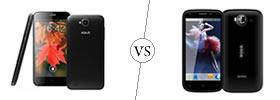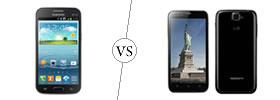Difference between Samsung Galaxy Tab 3 8.0 and Samsung Galaxy Tab 2 7.0
Key Difference: Samsung has added another tablet to its ever expanding line-up. The Tab 3 8-inch follows the Tab 3 7-inch that was launched earlier in 2013. The tablet comes with an 8-inch TFT capacitive touchscreen that offers approximately 189 ppi pixel density. The device comes in three different variants: Wi-Fi, 3G and 4G. The Samsung Tab 2 7.0 is a 7-inch tablet that offers a PLS TFT LCD display, with approximately 170 ppi density. The device is also available in two versions; Wi-Fi only and Wi-Fi + 4G. The Wi-Fi only tablet is powered by a 1 GHz Dual-core processor and is available with the Android v4.0 Ice Cream Sandwich, while the Wi-Fi + 4G LTE tablet is powered by a 1.2 GHz Dual-core processor and comes with Android v4.1 Jelly Bean.
 Samsung has added another tablet to its ever expanding line-up. The Galaxy Tab 3 8-inch follows the Tab 3 7-inch that was launched earlier in 2013. The tablet is supposed to fill the gap between the 7-inch and the 10-inch tablet. Many are also inferring that the tablet may be launched as a cheaper variant to the Galaxy Note 8.
Samsung has added another tablet to its ever expanding line-up. The Galaxy Tab 3 8-inch follows the Tab 3 7-inch that was launched earlier in 2013. The tablet is supposed to fill the gap between the 7-inch and the 10-inch tablet. Many are also inferring that the tablet may be launched as a cheaper variant to the Galaxy Note 8.
The Samsung Galaxy Tab 3 8-inch comes with an 8-inch TFT capacitive touchscreen that offers approximately 189 ppi pixel density. The device comes in three different variants: Wi-Fi, 3G and 4G. The Wi-Fi model does not offer calling capabilities, while the models do. Other than this major difference the rest of the models are almost the same differing only in weight. All of the variants come with the TouchWiz UI that is found in all of the recent Samsung devices. The device resembles the Galaxy Note 8 in terms of design. It has the same curved corners with a white bezel. There is one hardware button in the middle under the screen that is flanked by two capacitive buttons.
A camera and a mic are placed on the top of the display screen along with the proximity sensor. The right side of the device houses the power button, the volume rocker and the USB port, while the left side of the device has the microSD card port. The back has a camera and the LED flashlight. The device is powered by a 1.5 GHz Dual-cored processor; however, the company has yet to announce which processor it is using. Many techies suspect it is the new Intel Atom processor.
Galaxy Tab 3 8-inch is available with two different internal storage capacities: 16 GB and 32 GB, which can be expanded by 64 GB via microSD card. All of the variants are available with 1.5 GB RAM. The device houses a 5MP rear camera and a 1.3 MP front camera. The 5MP camera can record 720p video. The tablet comes with Google Android v 4.2.2 Jelly out of the box. The company has also added a bunch of apps that makes the device more user friendly such as Samsung Hub, Samsung Kies, Samsung Kies Air, Samsung ChatON, S Translator, S Travel, etc.
 Samsung Galaxy Tab 2 7.0 is a major upgrade to the company’s original Samsung Galaxy Tab. The tab shares many features to its big brother The Galaxy Tab and the Galaxy Tab 7.0 Plus. The tab is actually a downgrade compared to the Galaxy 7.0 Plus, including the price of the tablet. However, during the launch it was also the only Tablet on the market at that time which served the Android Ice Cream Sandwich right out of the box. The device is also available in two versions; Wi-Fi only and Wi-Fi + 4G. Both the devices differ in a few areas so, when purchasing either device, make sure to once look over the various different features that are offered in the Wi-Fi + 4G, which are missing the Wi-Fi only model.
Samsung Galaxy Tab 2 7.0 is a major upgrade to the company’s original Samsung Galaxy Tab. The tab shares many features to its big brother The Galaxy Tab and the Galaxy Tab 7.0 Plus. The tab is actually a downgrade compared to the Galaxy 7.0 Plus, including the price of the tablet. However, during the launch it was also the only Tablet on the market at that time which served the Android Ice Cream Sandwich right out of the box. The device is also available in two versions; Wi-Fi only and Wi-Fi + 4G. Both the devices differ in a few areas so, when purchasing either device, make sure to once look over the various different features that are offered in the Wi-Fi + 4G, which are missing the Wi-Fi only model.
Both the models offer similar dimensions and major features, with the differences being only with the processor speed, OS, camera features and colors. The Samsung Tab 2 7.0 is a 7-inch tablet that offers a PLS TFT LCD display, with approximately 170 ppi density. The Plane to Line Switching (PLS) differs from the IPS technology of the other tablets and while it provides decent wide viewing angles, it still has a high propensity for reflecting surfaces. The display also lags compared to the other IPS displays with higher resolutions. The tablet is small and sleek compared to the other 7-inch devices making it lighter and easier to hold. The device has a sturdy design and has an all-grey plastic back. It has a thick bezel with a light grey screen. The device houses the power button, the volume button and the IR-port on the right side of the device, the microSD card slot is placed on the left side covered by a plastic flap. The 3.5mm jack is on top of the device and docking port is at the bottom.
The Wi-Fi only tablet is powered by a 1 GHz Dual-core processor and is available with the Android v4.0 Ice Cream Sandwich, while the Wi-Fi + 4G LTE tablet is powered by a 1.2 GHz Dual-core processor and comes with Android v4.1 Jelly Bean. Both devices offer 1 GB RAM and are available with 8/16/32 GB internal storage capacity that is expandable by 32 GB. The tablets house a 3.15 MP rear camera and a VGA front camera for video conferencing. The VGA camera is a downgrade from the 2 MP offered on Galaxy Tab 7.0 Plus. The camera also comes with a Flash that is placed under the camera on the back of the device. The 4 LTE tablets also come with additional camera features such as: Smile Shot, Geo-tagging, Editing Modes, Camcorder, DivX, HD Recording, HD Playback, Video Share and Online Image Uploading.
Both the devices sport IR blasters, which allow the tablet to be used as a fully-functioning remote control. The device houses a non-removable Lithium-ion 4,000 mAh that provides a lasts a good amount of time on the Wi-Fi as well as the 4G network. The device is available in black and white on the Wi-Fi + 4 LTE, while an additional Garnet Red color has been added to the line for the Wi-Fi only tablet. Both the models come with various built in Samsung Applications and have been approved for Enterprise by the Company, something known as SAFE (Samsung Approved for Enterprise). This includes an array of business applications such as: Microsoft® Exchange ActiveSync, Virtual Private Network (VPN) Access, Polaris® Office, Video Chat, Cisco WebEx, EAS IT Policy, HW Encryption and Sybase Afaria. However, it lacks in terms of tablet based applications in Google Play. Well, that is not exactly Samsung’s fault but it is one of things that have been keeping pushing sales of Apple tablets more than Android Tablets. Google Play has not been able to offer enough applications that support the tablet format. This problem should only be temporary as the demand for tablets is on the rise in the market.
The information for the detailed table about the two devices has been taken from Samsung Mobile Press website, Samsung website, pcmag.com, engadget.com and GSMArena.com.
|
|
Samsung Galaxy Tab 3 8.0 |
Samsung Galaxy Tab 2 7.0 |
|
Launch Date |
Q3 2013 |
April 2012 |
|
Company |
Samsung |
Samsung |
|
Size |
209.8 x 123.8 x 7.4 mm |
193.7 x 122.4 x 10.5 mm |
|
Display |
8-inch TFT capacitive touchscreen |
7.0 in (18 cm) PLS TFT LCD display |
|
Screen |
800 x 1280 pixels (~189 ppi pixel density) 16M colors |
1024 × 600 pixels (~170 ppi pixel density) |
|
Protection |
- |
N/A |
|
Weight |
314 grams (Wi-Fi model) |
345 grams |
|
2G Network |
GSM 850 / 900 / 1800 / 1900 - SM-T310, SM-T315 |
GSM 850 / 900 / 1800 / 1900 |
|
3G Network |
HSDPA 850 / 900 / 1900 / 2100 - SM-T310, SM-T315 |
HSDPA 900 / 2100 - GT-P3100 HSDPA 850 / 900 / 1900 / 2100 - GT-P3105 |
|
4G Network |
LTE 800 / 850 / 900 / 1800 / 2100 / 2600 - SM-T315 |
Depends on market capability |
|
GUI |
TouchWiz UI |
TouchWiz UX UI |
|
CPU speed |
1.5 GHz Dual-core |
1 GHz Dual-core processor/ 1.2 GHz Dual-core Qualcomm processor (4G) |
|
GPU |
PowerVR SGX544 |
PowerVR SGX540 |
|
OS |
Android v4.2.2 (Jelly Bean) |
Android OS v4.0.3 (Ice Cream Sandwich), upgradable to v4.1.1 (Jelly Bean) |
|
Chipset |
Intel Atom Z2560 (rumored) |
TI OMAP 4430 |
|
RAM |
1.5 GB |
1 GB RAM |
|
SIM Size |
mircoSIM |
mini-SIM |
|
Internal Memory |
16/32 GB |
8/16/32 GB |
|
Expandable Memory |
Up to 64 GB |
Up to 32GB |
|
Sensors |
Wi-Fi: Accelerometer, Magnetic, RGB 3G/ LTE: Accelerometer, Magnetic, RGB, Approximate |
Accelerometer, digital compass, light and proximity |
|
Connectivity |
WiFi a/b/g/n (2.4/5GHz), WiFi Channel Bonding, WiFi Direct Bluetooth® 4.0, USB 2.0, DLNA, Wi-Fi hotspot, USB Host |
2G, 3G, 4G, Bluetooth technology v3.0, USB 2.0 Host, Wi-Fi 802.11 a/b/g/n, DLNA and Wi-Fi Direct |
|
Data |
GPRS, Edge, WLAN, Bluetooth, NFC, Infrared, USB. |
GPRS, EDGE, WLAN, Bluetooth, USB |
|
Speed |
HSDPA, 21 Mbps; HSUPA, 5.76 Mbps; LTE, Cat3, 50 Mbps UL, 100 Mbps DL |
HSPA+ 21Mbps 850/ 900/ 1900/ 2100 |
|
WLAN |
Wi-Fi 802.11 a/b/g/n, dual-band, DLNA, Wi-Fi Direct, Wi-Fi hotspot |
Wi-Fi 802.11 a/b/g/n, DLNA, Wi-Fi Direct, dual-band, Wi-Fi hotspot |
|
Bluetooth |
Bluetooth v4.0 with A2DP |
Bluetooth v3.0 with A2DP, HS |
|
USB |
microUSB v2.0, USB Host |
USB v2.0, USB On-the-go |
|
Primary Camera |
5 MP 2592х1944 pixels |
3.15 MP, 2048x1536 pixels |
|
Secondary Camera |
1.3 MP |
VGA |
|
Video |
Recording: 720p@30fps Playback: 1080p@30fps |
Full HD @30fps |
|
Camera Features |
|
|
|
Sound Enhancement |
Sound Alive and Dolby Surround |
SoundAlive |
|
Audio supported formats |
MP3, OGG, AAC, AAC+, eAAC+, E-AC3, WMA, FLAC |
MP3, AAC, AC-3, AMR, FLAC, MID, WMA, WAV, OGG |
|
Video supported formats |
MPEG4, H.264, H.263, WMV, DivX (1080p Full HD @30fps) |
3GP, ASF, AVI, MP4, WMV, FLV, MKV, WebM |
|
Battery Capacity |
Non-removable Li-Ion 4450 mAh battery |
Non-removable Lithium-ion 4,000 mAh |
|
Talktime |
No official data released |
2G: 40 hours 3G: 20 hours |
|
Standby Time |
No official data released |
2G: 1190 hours 3G: 1080 hours |
|
Available Colors |
White |
Black, White, Red |
|
Messaging |
SMS(threaded view), MMS, Email, Push Email, IM |
SMS(threaded view), MMS, Email, Push Email, IM, RSS |
|
Browser |
HTML5 |
HTML5, Adobe Flash |
|
Radio |
N/A |
No |
|
GPS |
A-GPS + GLONASS |
A-GPS support and GLONASS |
|
Java |
via Java MIDP emulator |
Java via Java MIDP emulator |
|
Additional Features |
|
|
Image Courtesy: samsungmobilepress.com, samsung.com









Add new comment